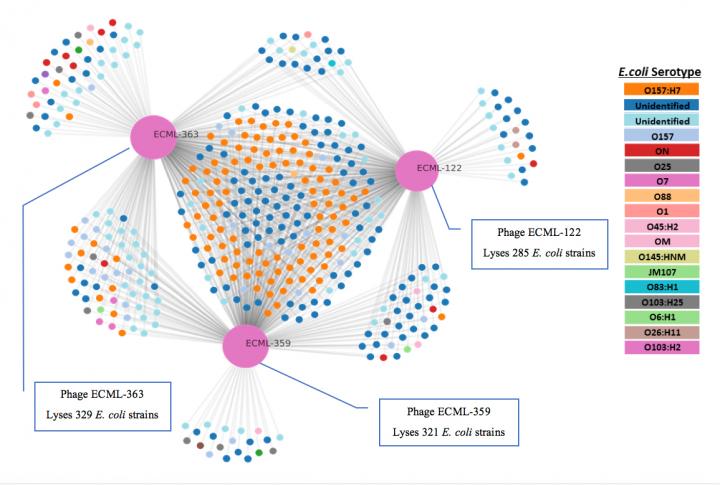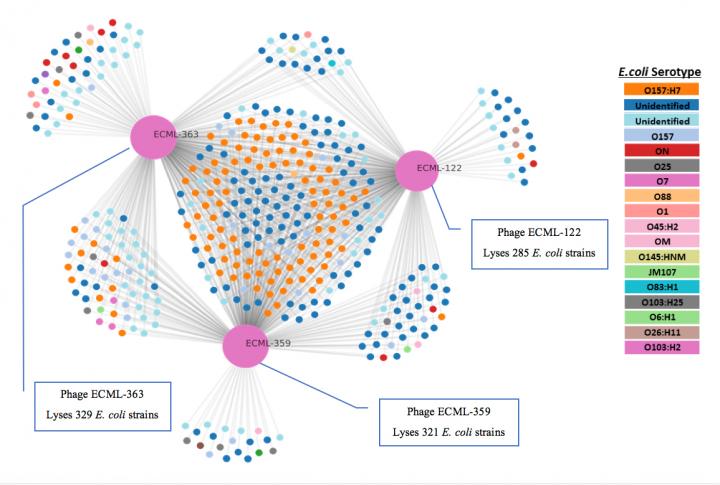
Credit: The graph was generated using proprietary PhageSelector™ program developed by Intralytix, Inc.
Imagine that you have become ill because you have eaten some food that contained pathogenic bacteria. You keep running to the toilet and you may also throw up. You go to the doctor and are prescribed broad-spectrum antibiotics, which – in addition to killing the bad bacteria in your intestinal flora – carpet bomb the complex community of commensal bacteria forming a healthy intestinal flora.
New research from the Department of Food Science (FOOD) at the University of Copenhagen suggests that, in the not-too-distant future, it might be possible to drink a cocktail of selective viruses (bacteriophages) that travel directly into the gut and kill the disease-causing bacteria, so you get better – without the use of antibiotics and without harming the beneficial commensal intestinal bacteria.
The researchers have come a step closer to this scenario.
"The research shows that we have an opportunity to kill specific bacteria without collateral damage to the other, and otherwise healthy, intestinal flora", says Professor Dennis Sandris Nielsen from Department of Food Science at the University of Copenhagen.
He emphasizes that the result was created in a model of the small intestine; so the next step will be to test the study on mice and later on humans if such treatment is to be implemented.
Model of the small intestine
The model in which the research has been conducted, TSI, was developed at FOOD by postdoc Tomasz Cieplak, in connection with his PhD project, with Professor Dennis Sandris Nielsen as his supervisor.
"The novelty of the TSI model is that it simulates the presence of the small intestinal microbiota, which has largely been overlooked in other models of the small intestine. Other models existing on the market simulate only the purely biophysical processes, such as bile salts and digestive enzymes or pH, but here we included this important aspect of human gut physiology to mimic the small intestine more closely", says Cieplak.
The composition of the intestinal flora in the model is representative of how the intestinal flora could look in a healthy person. In the study, researchers have added E. coli bacteria to the intestinal flora, which they then attempted to kill by utilizing a targeted cocktail of viruses (bacteriophages) developed by the company Intralytix.
New research in an old method
"Using bacteriophages to kill pathogenic bacteria is not new and has actually been used to treat food-borne illnesses and other diseases in Eastern Europe for almost a century, but it was not until relatively recently that this approach started to attract more widespread research interest", says Dennis Sandris Nielsen
The research into combating infectious diseases with viruses was not as interesting because you already had an effective treatment with antibiotics.
"It is different today, where resistance to antibiotics is an increasing problem in modern medicine. At the same time, we have become more aware of how important the commensal bacteria in the gut are for our health", says Nielsen.
Phages (bacteriophages) are viruses that attack bacteria – in this context, bacteria in our intestinal microbiome. The classic lytic phage attacks bacteria by attaching to the surface of the bacterium and injecting its genetic material into the bacterium. It takes over the bacterium's metabolism and redirects it to create new viruses. The bacterial cell, now taken over by the phage, will explode and send a lot of new phages into the surrounding area, which can then attack new bacteria.
###
Facts about the research
The research article "A bacteriophage cocktail targeting Escherichia coli reduces E. coli in simulated gut conditions, while preserving a non-targeted representative commensal normal microbiota" is published in the scientific journal Gut Microbes. (https://doi.org/10.1080/19490976.2018.1447291)
The authors are: Tomasz Cieplak, postdoc at the Department of Food Science at the University of Copenhagen (FOOD), Nitzan Soffer, Intralytix, Alexander Sulakvelidze, Intralytix, and Dennis Sandris Nielsen, professor at FOOD.
The research was carried out in collaboration between FOOD and Intralytix Inc., Baltimore, USA, which was the first company to receive the Federal Drug Administration's (FDA's) approval to use bacteriophages in food safety applications. The company produces several products based on bacteriophages to fight food-borne pathogens. Recently, Intralytix was granted clearance by the FDA to initiate Phase I/II clinical trials for testing the efficiency of bacteriophages in the treatment of inflammatory bowel disease. The Company holds several bacteriophage-related patents (including two US patents on using phages for modulating animal – including human – microbiomes) and is actively expanding its product portfolio of phage-based preparations for modulating human microbiota for various health benefits.
The development of the TSI small intestinal model was financed via the People Programme (Marie Curie Actions) of the European Union's Seventh Framework Programme FP7/2007-2013/under REA grant agreement n° 606713.
Media Contact
Lene Hundborg Koss
[email protected]
http://www.science.ku.dk/english/
Original Source
http://food.ku.dk/english/news/2018/researchers-assassinate-bacteria-with-virus-cocktail-in-a-model-of-the-small-intestine/ http://dx.doi.org/10.1080/19490976.2018.1447291





